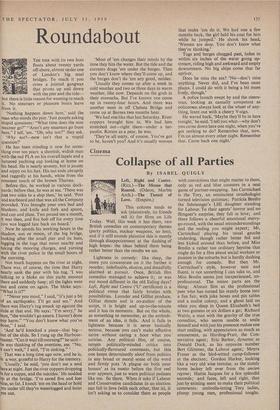Roundabout
'Nothing happens down here,' said the man who minds the pier. 'Just people asking stupid questions: "What time does the next steamer go?" "Aren't any steamers go from here," I tell, 'em. "Oh, why not?" they ask.
'Why not?—now isn't that a stupid question?'
He has been minding it now for some- thing over ten years a shortish, widish man with the red PLA on his overall lapels and a battered yachting cap looking at home on his head. He is nearly seventy, but is jaunty and nippy on his feet. His tan ends abruptly and raggedly at his hands, white from the constant touch of the brown Thames.
Before this, he worked in various dock- yards; before that, he was at sea. 'There was just two sides to a ship then,' he said. 'Port and starboard and that was all the Company provided. You brought your own bed and blankets, and knife and fork and spoon, and cup and plate. Two pound ten a month, it was then, and five bob off for every time You was logged late back on board.'
Now he spends his working hours in the shadow, sun or moon, of the big bridge, looking after the small pier and its huts, logging in the tugs that moor nearby and taking the mooring charges, and yarning with the river police in the small hours of the morning.
Not much happens on the river at night. There was, of course, the time that Harry nearly sank the pier with his tug. 'I was talking to a bloke on this yacht moored there and suddenly bang; all the lights went out and come on again. The bloke says: "What is it?"
"Never you mind," I said, "it's just a bit of an earthquake. I'll go and see." And there was Harry's tug smack up against the slide at that end. He says: "I'm sorry," he says, "she wouldn't go astern. I haven't done any harm." "You don't know what you've done," I said.
'And he'd knocked a piece--that big— out of the slide. So I rung up the Harbour- Master. "Can it wait till morning?" he said— he was thinking of the overtime, see. "No, it can't wait," I said, "I'm sinking." ' That was a long time ago now, and he is, In a way, grateful to Harry for the memory.
'Usually,' he said, 'you don't see a soul here at night. Just the river coppers dropping In for a cuppa, and the suicides.' He nodded Up at the bridge. 'I've saved five and lost !line, so far. I knock 'em on the head or hold em under till they're waterlogged and hoist em out. 'Most of 'cm changes their minds by the time they hits the water. But the tide and the currents drags 'em under the barges. Then you don't know where they'll come up, and the barges don't do 'em any good, neither.
'Usually they comes up after a week in cold weather and two or three days in warm weather, like now. Depends on the grub in their stomachs. But I've known one come up in twenty-four hours. And there was another went in off Chelsea Bridge and come up at Barnes two months later.
'We had one like that last Saturday. River coppers brought him in. We had him stretched out—right there—under a tar- paulin. Rotten as a pear, he was.
'They're all nutty, of course. You've got to be, haven't you? And it's usually women
that make 'em do it. We had one a few months back, the girl held his coat for him while he jumped.' He shook his head. 'Women are deep. You don't know what they're thinking.'
Tugs and barges chugged past, laden to within six inches of the water going up- stream, riding high and awkward and empty downstream. No big ships come that far upriver.
Does he miss the sea? 'No—don't miss anything. Never did, and I've been most places. I could do with it being a bit more lively, though.'
A police launch swept by and the steers- man, looking as casually competent as policemen always look at the wheel of any- thing, leant out with a cheery V-sign.
He waved back. 'Maybe they'll be in here tonight,' he said. 'I tell you what—why don't you come down here one night, when you've got nothing to do? Remember that, now. I'm on almost every other night. Remember that. Come back one night.'






























 Previous page
Previous page